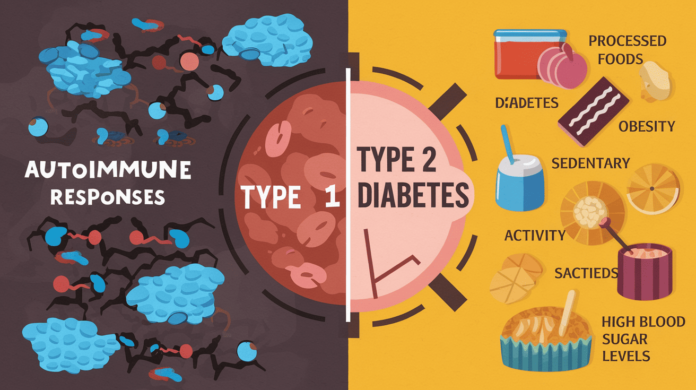Causes of Diabetes
Thinking about your health might make you curious about Causes of Diabetes. You might wonder, how do you get diabetes? And what are the risk factors for type 1 diabetes? Knowing about type 2 diabetes causes is key to managing your health.
Exploring diabetes, you’ll find it’s a complex issue. It’s shaped by genetics and the environment. Learning about diabetes causes helps you live a healthier life. It also lowers your risk of getting diabetes.
Key Takeaways
- Understanding diabetes causes is essential in managing your risk of developing type 1 and type 2 diabetes.
- Type 1 diabetes risk factors include genetic predisposition and environmental triggers.
- Type 2 diabetes causes are often linked to lifestyle factors, such as diet and physical activity.
- Recognizing the signs of diabetes can help you take prompt action and prevent complications.
- By knowing how you get diabetes, you can take proactive steps to reduce your risk and maintain a healthy lifestyle.
- Staying informed about diabetes causes and risk factors is vital in making informed decisions about your health.
- Empowering yourself with knowledge about type 1 and type 2 diabetes causes can help you take control of your well-being.
What Is Diabetes and How Does It Develop?
Diabetes is a long-term health issue that affects how your body handles blood sugar. The causes of type 1 diabetes and causes of type 2 diabetes differ, but both involve insulin problems. Insulin is key for your cells to take in glucose from your blood.
When you have diabetes, your body either makes too little insulin or can’t use it well. This results in high blood sugar levels.
The risk factors for diabetes include genetics, environment, and Lifestyle . Knowing these factors helps in managing and preventing diabetes. Key factors include:
- Genetic predisposition
- Obesity and physical inactivity
- Unhealthy diet and nutrition
- Age and family history
Learning about diabetes helps you understand how these factors raise your risk. Knowing the causes of type 1 diabetes and causes of type 2 diabetes is crucial for managing your health and lowering your risk.
The Role of Insulin in Blood Sugar Control
Insulin is essential for controlling blood sugar. When you eat, your body turns carbs into glucose, which enters your blood. Insulin helps your cells take in this glucose, lowering blood sugar.
In diabetes, the body can’t make or use insulin well. This leads to high blood sugar levels.
The Main Causes of Diabetes: Type 1 vs Type 2
Understanding diabetes starts with knowing the role of genetics and diabetes. Studies show genetics play a big part in both type 1 and type 2 diabetes. Also, environmental factors in diabetes like diet and lifestyle matter too.
Type 1 diabetes is often linked to an autoimmune attack on insulin-producing cells. In contrast, type 2 diabetes triggers are usually related to insulin resistance and obesity. These can be influenced by both genetics and lifestyle.
Key factors in diabetes include:
- Family history and genetic predisposition
- Environmental factors such as diet and lifestyle
- Autoimmune responses, such as those that occur in type 1 diabetes
- Insulin resistance and obesity, which are common in type 2 diabetes
Knowing the causes of diabetes is key to preventing and treating it. By understanding genetics and lifestyle’s impact, people can lower their diabetes risk. They can also manage the disease better if they have it.
Genetic and Environmental Risk Factors for Type 1 Diabetes
Research shows that is type 1 diabetes hereditary is a big yes. But, it’s not just genes. Environmental factors also play a part. Knowing these can help you understand your lifestyle and diabetes risk.
Your diabetes and family history matter a lot. If your family has type 1 diabetes, you might get it too. Also, things like viral infections can raise your risk.
Autoimmune Triggers and Their Impact
Autoimmune triggers, like viral infections, can start an immune attack on your pancreas. This can lead to type 1 diabetes. It’s key to know your lifestyle and diabetes risk and how to manage it.
Age and Geographic Factors
Age and where you live can also affect your risk. Type 1 diabetes often hits kids and teens. Some places have more cases than others.
Family History and Genetic Predisposition
Having a family history of type 1 diabetes ups your risk. It means you might be more likely to get it. Knowing your diabetes and family history helps you take steps to avoid it.
Lifestyle Factors That Influence Type 2 Diabetes Development
Lifestyle choices are key in how to prevent type 2 diabetes. Your daily habits can either raise or lower your risk. Knowing how diet, exercise, stress, and sleep affect your blood sugar is important.
Eating right is crucial in avoiding insulin resistance and type 2 diabetes. Eat whole foods like veggies, fruits, grains, lean meats, and healthy fats. These foods help control blood sugar and keep you healthy. Also, understanding hormonal factors in diabetes helps you make better diet and lifestyle choices.
Diet and Nutrition Impact
Eating well helps keep your weight in check, which is key in preventing type 2 diabetes. Remember, beta cell function and type 1 diabetes are different. But, a healthy lifestyle is good for everyone’s health.
Physical Activity and Weight Management
Staying active and managing your weight are also important. Aim for 150 minutes of moderate exercise, 75 minutes of vigorous exercise, or a mix of both weekly. Include strength training, high-intensity interval training, and other activities to stay active and healthy.
Conclusion: Understanding Your Risk and Taking Action
Learning about diabetes shows us how different type 1 and type 2 are. Type 1 is mostly about genetics and the immune system. But type 2 is more about lifestyle, like what you eat and how active you are.
Knowing your risk is the first step to better health. It helps you avoid diabetes. Regular health checks and making healthy choices can help a lot.
By eating right, moving more, and managing stress, you can lower your risk. This keeps your body working well. Catching diabetes early is key to avoiding serious problems.
Your health is up to you. Learn about type 1 and type 2 diabetes. With the right knowledge and care, you can manage your risk and live a healthier life.
FAQ
What is the difference between type 1 and type 2 diabetes?
Type 1 diabetes is when your body attacks and destroys insulin-making cells. This makes it hard to make insulin. Type 2 diabetes is when your body’s cells don’t respond well to insulin. This leads to high blood sugar levels.
What are the risk factors for developing type 1 diabetes?
Risk factors for type 1 diabetes include genetics and family history. Viral infections and autoimmune responses also play a part.
What causes type 2 diabetes?
Type 2 diabetes often comes from lifestyle choices. Being overweight, not moving enough, and eating too much sugar can lead to it. These habits make your body less responsive to insulin.
Can diabetes be prevented?
While type 1 diabetes is mostly genetic, type 2 can be prevented. Eating well, staying active, and keeping a healthy weight can help. These steps can lower your risk of getting type 2 diabetes.
Is diabetes hereditary?
Yes, diabetes can run in families. If your relatives have diabetes, you’re more likely to get it. But, lifestyle and environment also matter a lot.
How do hormones affect the risk of diabetes?
Hormonal imbalances, like in PCOS, can raise your risk of diabetes. Managing these hormones is key to keeping blood sugar levels healthy.
What is the role of the immune system in type 1 diabetes?
In type 1 diabetes, the immune system attacks insulin-making cells. This autoimmune attack is a main cause of the disease. Understanding this is important for managing and possibly preventing it.
Main References: National Library of Medicine






















